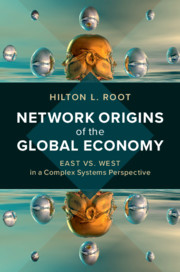Crossref Citations
This Book has been
cited by the following publications. This list is generated based on data provided by Crossref.
Seligson, Daniel
and
McCants, Anne E. C.
2021.
Coevolving institutions and the paradox of informal constraints.
Journal of Institutional Economics,
Vol. 17,
Issue. 3,
p.
359.
Kollár, Dávid
2021.
Max Weber and the chemistry of the Protestant ethic.
Social Science Information,
Vol. 60,
Issue. 4,
p.
504.
Arthur, W. Brian
2021.
Foundations of complexity economics.
Nature Reviews Physics,
Vol. 3,
Issue. 2,
p.
136.
Acs, Zoltan J.
Song, Abraham K.
Szerb, László
Audretsch, David B.
and
Komlósi, Éva
2021.
The evolution of the global digital platform economy: 1971–2021.
Small Business Economics,
Vol. 57,
Issue. 4,
p.
1629.
Acs, Zoltan J.
Song, Keunwon
Szerb, Laszlo
Audretsch, David B.
and
Komlosi, Eva
2021.
The Evolution of the Global Digital Platform Economy: 1971-2021.
SSRN Electronic Journal,
Shibuya, Kazuhiko
2022.
The Rise of Artificial Intelligence and Big Data in Pandemic Society.
p.
3.
Shibuya, Kazuhiko
2022.
The Rise of Artificial Intelligence and Big Data in Pandemic Society.
p.
159.
Redding, Gordon
2022.
East Asia in transition.
Asia Pacific Business Review,
Vol. 28,
Issue. 2,
p.
308.
Akkas, Erhan
and
Altiparmak, Suleyman Orhun
2022.
The Reshaping Oil and Arms Trade between the United States and GCC: Is the Theory of Complex Interdependence Still Prevailing?.
Journal of Asian and African Studies,
Vol. 57,
Issue. 7,
p.
1430.
Szerb, László
Somogyine Komlosi, Eva
Acs, Zoltan J.
Lafuente, Esteban
and
Song, Abraham K.
2022.
The Digital Platform Economy Index 2020.
p.
3.
Huggins, Robert
and
Thompson, Piers
2022.
Cities, innovation and entrepreneurial ecosystems: assessing the impact of the COVID-19 pandemic.
Cambridge Journal of Regions, Economy and Society,
Vol. 15,
Issue. 3,
p.
635.
Acs, Zoltan J.
2022.
Questioning the Entrepreneurial State.
Vol. 53,
Issue. ,
p.
317.
Shibuya, Kazuhiko
2022.
The Rise of Artificial Intelligence and Big Data in Pandemic Society.
p.
175.
Trantidis, Aris
2022.
Fallacies of Democratic State-Building.
International Studies Review,
Vol. 24,
Issue. 4,
Shibuya, Kazuhiko
2022.
The Rise of Artificial Intelligence and Big Data in Pandemic Society.
p.
53.
Ellis, David C.
and
Black, Charles N.
2023.
The Great Power Competition Volume 4.
p.
67.
Root, Hilton L.
2023.
The Entrepreneurial Ecosystem.
p.
363.
Acs, Zoltan J.
2023.
The Palgrave Encyclopedia of Entrepreneurship.
p.
1.
Apostol, Stefan
2023.
Digitalization and Platformization in Romania Based on the Digital Platform Economy Index 2020.
Central European Business Review,
Vol. 12,
Issue. 4,
p.
77.
Düben, Christian
and
Krause, Melanie
2023.
The Emperor’s Geography—City Locations, Nature and Institutional Optimisation.
The Economic Journal,
Vol. 133,
Issue. 651,
p.
1067.



